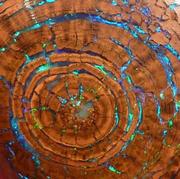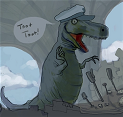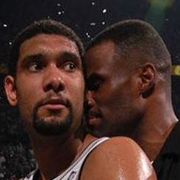|
quote:or Clip sacrificed them quote:edit: Enjoy the series!
|
|
|
|

|
| # ? May 13, 2024 22:17 |
|
Pretty sure he backed out of the discussion but great job on the last-word-in snide remark.
|
|
|
|
the periodic fable posted:Pretty sure he backed out of the discussion but great job on the last-word-in snide remark. You're going for irony here I guess?
|
|
|
|
Sir Bruce posted:The tyrants (and the whole Jaghut-Imass war) is one area where I thought a little more context was needed. Just one additional prologue section or something. I thought there was at least a couple of sections that kind of talked about that...how the Jaghut Tyrants learned that they could set themselves up as gods to the Imass and rule them on whatever whim they felt like, until the Imass figured it out and flipped the gently caress out and went to war for vengeance of being treated like poo poo for so long, then got ripped to pieces tot he point where they decided "hey, becoming undead killing machines is the way to work this out" and were basically totally unreasonable because they have underdeveloped emotional capacities or something
|
|
|
|
Levitate posted:I thought there was at least a couple of sections that kind of talked about that...how the Jaghut Tyrants learned that they could set themselves up as gods to the Imass and rule them on whatever whim they felt like, until the Imass figured it out and flipped the gently caress out and went to war for vengeance of being treated like poo poo for so long, then got ripped to pieces tot he point where they decided "hey, becoming undead killing machines is the way to work this out" and were basically totally unreasonable because they have underdeveloped emotional capacities or something The revolt was well-fleshed out, especially with it leading to the Ritual. I just wanted a little more on the interplay between the Tyrants, the majority of the Jaghut, and the Imass. It's not clear why the war led to the destruction of all the peaceful Jaghut, except that the Imass are hard-rear end motherfuckers.
|
|
|
|
I remember it being pretty much only thatthe Imass decided that as long there were Jaghut left alive the risk remained of a Tyrant emerging so they all had to die. It's kind of simplistic and I personally have a hard time believing an entire people (barring a couple) would subscribe to this no matter how enraged by past injustices but then again I'm human and not Imass (which feels ever so slightly like a copout excuse). edit: Levitate posted:and were basically totally unreasonable because they have underdeveloped emotional capacities or something Yeah, this is a good point, though I can't remember if it was ever outright stated in the books. Opal fucked around with this message at 15:41 on Oct 27, 2011 |
|
|
|
Sir Bruce posted:The revolt was well-fleshed out, especially with it leading to the Ritual. I just wanted a little more on the interplay between the Tyrants, the majority of the Jaghut, and the Imass. It's not clear why the war led to the destruction of all the peaceful Jaghut, except that the Imass are hard-rear end motherfuckers. My impression was that there was not a lot of interplay between the Tyrants, as their defining characteristic was their arrogance and hence their inability to get along with each other. They ended up shutting themselves off in ice fortresses etc (which led to the need for the Imass to perform the ritual)
|
|
|
|
the periodic fable posted:Yeah, this is a good point, though I can't remember if it was ever outright stated in the books. Eh, it kind of was. They were often described as being incredibly emotional people (loving cry about everything, jesus christ), and I felt the subtext to that was it was to the point where they hadn't really developed a lot of control over their emotions so when they got so pissed off at the Jaghut they just went "raaaggh kill them all" and lacked the ability to step back and be reasonable. Kind of like 16 year old girls or something
|
|
|
|
Levitate posted:Eh, it kind of was. They were often described as being incredibly emotional people (loving cry about everything, jesus christ), and I felt the subtext to that was it was to the point where they hadn't really developed a lot of control over their emotions so when they got so pissed off at the Jaghut they just went "raaaggh kill them all" and lacked the ability to step back and be reasonable. Kind of like 16 year old girls or something Pretty much... quote:The Jaghut played games with us. They painted themselves in the guises of gods. It amused them. Our indignation stung to life became a rage of unrelenting determination. But it was misplaced. In our awakening to their games, they had no choice but to withdraw. The secret laid bare ended the game. The wars were not necessary. Our pursuit acquired the mien of true madness, and in assuming it we lost ourselves … for all time.
|
|
|
|
Levitate posted:Eh, it kind of was. They were often described as being incredibly emotional people (loving cry about everything, jesus christ), and I felt the subtext to that was it was to the point where they hadn't really developed a lot of control over their emotions so when they got so pissed off at the Jaghut they just went "raaaggh kill them all" and lacked the ability to step back and be reasonable. Kind of like 16 year old girls or something I don't think people understand just how terrible the Tyrants probably where, they enslaved whole peoples and played god. And they where loving evil about it, to me Kallor is a nice guy compared to a Tyrant...
|
|
|
|
I think Kallor is worse since he didn't left anyone he enslaved alive to rebel against him.
|
|
|
|
zokie posted:I don't think people understand just how terrible the Tyrants probably where, they enslaved whole peoples and played god. And they where loving evil about it, to me Kallor is a nice guy compared to a Tyrant... Oh very true, but the Imass didn't just say "let's kill the Tyrants", they went "gotta kill all Jaghut even though 95% of them just wanna chill, can't be too careful"
|
|
|
|
Levitate posted:Jaghut just wanna chill
|
|
|
|
I'm just glad that when I see he words "Omtose Phellack" I finally think "cold.". Thanks, MoI!
|
|
|
|
Isn't it also brought up later that the Jaghut relationship with the K'Chain Che'malle was essentially the same as the Imass relationship with the Jaghut? I'm also gonna say that there's no real difference between Kallor and the Jaghut Tyrants. Kallor didn't set himself up as a god, but the Tyrants didn't wipe out their own civilization to quash rebellions. There's a deliberate contrast in the series between characters like Raest, Kallor, Mallick Rel, and (arguably) Laseen who want power for the sake of power as opposed to characters like Rake, Whiskeyjack, Paran, and Tehol who have power they never really sought but take on as a responsibility to their followers.
|
|
|
|
I have to admit, it is real weird and unrealistic for a bunch of sentient beings to decide another bunch that look different ALL need to die, because a few of them wronged them. I mean, it's not like human history, the very thing Erikson draws his inspiration from, is littered with genocides, is it?
|
|
|
|
WeWereSchizo posted:Isn't it also brought up later that the Jaghut relationship with the K'Chain Che'malle was essentially the same as the Imass relationship with the Jaghut? Hmm I don't remember this at all. I recall Tool or one of the other T'lan Imass saying they should have gone to war with them because they hunted the Imass for fun but I can't remember anything between them and the Jaghut. I don't really get the confusion about the Imass going to war. For most of our own history the vast majority of people considered members of other tribes/cultures/countries to be subhuman and thus it was fully justified to kill/rape/enslave them. How do you think history would have gone if there were actually non-human beings out there that occasionally dominated societies and made themselves gods? Although thinking about it weren't the tyrants pretty much actually gods? They were certainly more powerful than most of the current crop of gods. They were worshiped. They intervened in their followers lives which is more than most of the other gods do. The humans didn't choose Hood as the god of death anymore than the Imass chose the tyrants. It seems like the tyrants weren't false at all. Bonus series spoiler question: Was Hood the first or greatest tyrant? He managed to get the whole drat Jaghut race under his thumb and used them to get what he wanted. Makes sense the rest of the Jaghut hate tyrants so loving much after having been used by one.
|
|
|
|
LtSmash posted:Hmm I don't remember this at all. I recall Tool or one of the other T'lan Imass saying they should have gone to war with them because they hunted the Imass for fun but I can't remember anything between them and the Jaghut. I don't think anyone's confused about the Imass going to war. I was just saying that a little more background on the tyrants vs normal Jaghuts would have helped a lot in thinking about the backdrop of that war. Were they complicit? Subjugated? Eager adherents? Everything we hear about non-Tyrant Jaghuts suggest they just want to be left the hell alone, so how exactly did this war develop? I'm aware we can speculate on the possible answers to that question, but my point is that a little more by Erikson would have gone a long way in clarifying the situation. The Tyrant/non-Tyrant distinction is important but underdeveloped. On your spoiler: I thought Hood convinced all the other Jaghut to join, since his cause of defeating death was worthy enough. I didn't get the impression that they were forced or tricked into service. I'm only in book 8 so maybe there's more later, though.
|
|
|
|
LtSmash posted:Was Hood the first or greatest tyrant? He managed to get the whole drat Jaghut race under his thumb and used them to get what he wanted. Makes sense the rest of the Jaghut hate tyrants so loving much after having been used by one.
|
|
|
|
WeWereSchizo posted:I agree with Sir Bruce on this one. I don't think Hood was ever a tyrant. He convinced an army of Jaghut to join him, the only time an army of Jaghut was ever raised. The undead Jaghut you meet don't seem to be particularly mad at Hood. Well Gothos (I think) talks about how the Jaghut as a race were broken by Hood's war long before the Imass started fighting them. I don't mean tyrant in the sense of forcibly controlling them the way Raest controlled the Imass or tried to control Ganoes. But more of a Hood wanted power and domination much the way Raest and the other tyrants did. Hood got it not by directly dominating the other Jaghut but by using the normal domination of authority and command, like non-ascended humans do. The other Jaghut were so horrified by being mislead and seeing what could happen that they more or less totally abandoned civilization and became an entire race of hermits hiding from the potential for authority that any community inherently has. The only time they come together beyond their immediate family is when they must in order to overcome a tyrant. Or possibly in (book 9/10 spoiler) Icarias after Icarium built it. There seems to be an inversion there with Icarium's boundless power but total lack of ambition or authority. But that is going down its own rabbit hole.
|
|
|
|
On Hood (whole series spoilers): Hood fully expected the undead Jaghut to take vengeance on him when he came back in DoD, and admitted that he was wrong about... whatever it was that he did to end the Jaghut war against death. There are many hints that he betrayed his race somehow, and while I don't believe he was a true Tyrant, I think he may have been looking out for number one when he originally took the throne of Death. Also, the Imass didn't all join the ritual. Besides Kilava, in books 9 and 10 we meet a whole bunch of Imass who avoided the original ritual and evolved beyond their undead brethren, then became T'lan during a later ritual. Tool and his companions are extremely surprised that these other clans even exist.
|
|
|
|
Juaguocio posted:On Hood (whole series spoilers): Hood fully expected the undead Jaghut to take vengeance on him when he came back in DoD, and admitted that he was wrong about... whatever it was that he did to end the Jaghut war against death. There are many hints that he betrayed his race somehow, and while I don't believe he was a true Tyrant, I think he may have been looking out for number one when he originally took the throne of Death. I was under the impression that he didn't intend to take the throne and that he was surprised to find out that by defeating "death" he had to take its place. It's been a while, so I could be wrong.
|
|
|
|
WeWereSchizo posted:Isn't it also brought up later that the Jaghut relationship with the K'Chain Che'malle was essentially the same as the Imass relationship with the Jaghut? I don't think so because the K'Chain as a whole was pretty broken up and near extinct from fighting the united armies of darkness and shadow and also from fighting the multi jointed justice freaks. The only race they really hosed were puny human tribes. Vanilla Mint Ice fucked around with this message at 23:05 on Oct 27, 2011 |
|
|
|
Lyer posted:I was under the impression that he didn't intend to take the throne and that he was surprised to find out that by defeating "death" he had to take its place. It's been a while, so I could be wrong. I was kind of under the impression he realized that the war against death was impossible to win, so he took the throne of death as a way to control it, of sorts, and in doing so pretty much betrayed the Jaghut he gathered to fight with him against death. Could be wrong. I think he talks at some point in TCG or DoD about how it was before he started running things and how it was a shitshow Vanilla Mint Ice posted:I don't think so because the K'Chain as a whole was pretty broken up and near extinct from fighting the united armies of darkness and shadow and also from fighting the multi jointed justice freaks. Someone definitely says something about the K'Chain subjugating the Jaghut in a similar way they did to the Imass, but they could be totally wrong and it's not really followed up on and in subsequent books doesn't appear to be completely correct
|
|
|
|
LtSmash posted:Icarias after Icarium built it. There seems to be an inversion there with Icarium's boundless power but total lack of ambition or authority. But that is going down its own rabbit hole.
|
|
|
|
Sir Bruce posted:I don't think anyone's confused about the Imass going to war. I was just saying that a little more background on the tyrants vs normal Jaghuts would have helped a lot in thinking about the backdrop of that war. Were they complicit? Subjugated? Eager adherents? Everything we hear about non-Tyrant Jaghuts suggest they just want to be left the hell alone, so how exactly did this war develop? IIRC from what little previews we've seen, the next Esslemont book deals with Jaghut Tyrants so we'll probably get more info then.
|
|
|
|
Sir Bruce posted:I'm aware we can speculate on the possible answers to that question, but my point is that a little more by Erikson would have gone a long way in clarifying the situation. The Tyrant/non-Tyrant distinction is important but underdeveloped. That distinction is kept confusing because it's thematically fitting. That's the background of the story, not the story itself. The parts that are ambiguous are ambiguous in the present, and to the present "players". The same way they would be ambiguous to an historian. Whose account are you basing your opinions on? Jaghuts are almost gone from the world and T'lan are (literally) husks. The trace that Jaghut left on history is the one that is carried over by T'lan. Their version of history. And T'lan aren't exactly the third party, objective and reliable perspective. So that ambiguity is not due to a sloppily built background, but the kind of questions that you ARE SUPPOSED to wonder about. And no, it's not like Jaghuts are "born" tyrants. That's T'lan own deviation, and probably there's nothing about them that makes them "naturally" evil or destructive. Unrestrained power may.
|
|
|
|
quote:That's the background of the story, not the story itself. And do we really need to spoiler all the backstory discussion? It seems excessive and makes for a more annoying thread read in my opinion but if its really going to kill someone's enjoyment I'll start doing it.
|
|
|
|
Levitate posted:I was kind of under the impression he realized that the war against death was impossible to win, so he took the throne of death as a way to control it, of sorts, and in doing so pretty much betrayed the Jaghut he gathered to fight with him against death. Could be wrong. I think he talks at some point in TCG or DoD about how it was before he started running things and how it was a shitshow That's pretty much what I got out of it too, because I don't think there was an afterlife before Hood. At most there would be that Bridge of Death warren Paran and Hedge met up in tBH and at worst you'd get swallowed up by Chaos. quote:Someone definitely says something about the K'Chain subjugating the Jaghut in a similar way they did to the Imass, but they could be totally wrong and it's not really followed up on and in subsequent books doesn't appear to be completely correct I remember that bit too, and I recall somewhere the K'Chain didn't rule the Imass as gods, they hunted them for food. Don't forget, they had huge floating gently caress-off skykeeps that shot lasers. The only reason the KCCM lost their grip was from the Nah'ruk rebellion and the Tiste invasions. I don't think the Jahgut could have started a war with the KCCM, being the solitary creatures they are. Oh and the Forkrul Assail's powers don't work on them
|
|
|
|
Abalieno posted:That distinction is kept confusing because it's thematically fitting. Man I am so suspicious of the 'everything that isn't clear is intentionally unclear' style of argument. Well then why did this particular omission serve the narrative when other lines of history are explicitly described? The Jaghut left much more of a trace than on the Imass, there are Jaghut running around all over the place! And everyone who's in the know yaps about them all the time! All I want is like a small bit in the prologue to develop the distinction a little. It's not like this violates Erikson presenting artifacts of the past - the prologues give us explicit details of historical events in most of the books! And nowhere I said the background was sloppy, just that a little more information would provide better context for the current setting than Erikson currently provides. I fully believe that Erikson has a fleshed out world. That's most of the appeal of his books. He just struggles some times in realizing his own well-conceived vision on the page. Finally, if it isn't that some Jaghut are born as Tyrants, then what exactly is Raest's motivation? You said earlier that 'it was in the book' why Raest wanted to kill everyone. I must have missed that (as did others who agreed with me!). Perhaps you could provide a quote or something to help me out?
|
|
|
|
Sir Bruce posted:The Jaghut left much more of a trace than on the Imass, there are Jaghut running around all over the place! And everyone who's in the know yaps about them all the time! All I want is like a small bit in the prologue to develop the distinction a little. It's not like this violates Erikson presenting artifacts of the past - the prologues give us explicit details of historical events in most of the books! Haha, what? There's like four or five, and most of those are hiding in towers or stuck in Azath houses or something. Across 13 novels with hundreds of named characters. [edit: Just remembered the 14 guys that show up out of nowhere in TTH, but weren't they undead and newly reanimated or something like that? Eh, it's still not like there's a Jaghut on every corner.] And everyone yapping about them either wasn't around 300,000 years ago, or has a one-sided view of the conflict. Sorry that the one prologue scene that will explain everything hasn't been written, I guess. But remember: 1) The historical scenes we do get tend to create more questions than they answer, and 2) Erikson and Esslemont are still writing books. quote:Finally, if it isn't that some Jaghut are born as Tyrants, then what exactly is Raest's motivation? You said earlier that 'it was in the book' why Raest wanted to kill everyone. I must have missed that (as did others who agreed with me!). Perhaps you could provide a quote or something to help me out? I'm very confused as to what you're confused about. What is Raest's motivation to do what he did in the current timeline of GOTM? Or what was his motivation to create his empire way back in prehistory, before he was entombed? Also, he didn't want to kill everybody, he wanted to dominate everybody. That involved killing some people, but not everyone, or he wouldn't have anyone to rule over. And when we see him in GOTM he had just woken up and was a bit more homicidally grumpy than usual. Leospeare fucked around with this message at 04:09 on Oct 28, 2011 |
|
|
|
Why are some humans jerks? What made Hitler Hitler instead of Gandhi? My reading was that some Jaghut end up wanting power and domination for just the same reason some people do and any explanation beyond that is bound to be clumsy. You can say that he wasn't held enough as a baby or the culture he grew up in twisted his thinking but really nobody can say. And Raest didn't want to kill everything, he wanted to control everything. He wanted complete domination over everything and everyone he came in contact with. GotM explains it when he emerges from the tomb. He started with the animals but they weren't intelligent enough to offer real interest so he tried other Jaghut but they were realized what he was doing and they had the power to either escape or resist to the point where he ended up killing them. The Imass were just right. They were intelligent and interesting but hopelessly overwhelmed by his power. When they finally did realize has was in charge they declared him a god and worshiped him. The division of Tyrants from other Jaghut wasn't just an Imass thing. The other Jaghut reviled the Tyrants, possibly even more than the Imass did. The tyrants were the only thing able to bring the Jaghut back together. In the beginning of MoI the Jaghut had joined with the T'lan Imass against a tyrant but the Jaghut would not help each other once the tyrant was beaten and the T'Lan Imass attacked them.
|
|
|
|
Leospeare posted:Haha, what? There's like four or five, and most of those are hiding in towers or stuck in Azath houses or something. Across 13 novels with hundreds of named characters. And everyone yapping about them either wasn't around 300,000 years ago, or has a one-sided view of the conflict. Well obviously they're rare, but for supposedly extinct/mythical creatures there sure are a lot who keep popping up from under rocks! Literally, at least twice! The issue with motivation was that one of the original questions in the brouhaha a couple pages back was 'what was Raest's (or any Tyrant's) motivation for power'. Abalieno said 'it was in the book'. I didn't recall more than that some Jaghut were born with a desire for power/control and asked if there was anything more. Everyone seemed to agree that there wasn't too much more fleshed out, which is too bad, because I think it it would have given a lot more context to several of the 'present' day conflicts. LtSmash is getting somewhere near there, with 'control everything', which isn't much in terms of characeterization, but at least it's a recognizable villain. As I said before, I don't really mind Raest's characterization as super-powerful evil being in GOTM. It's just that the ancient Imass-Tyrant-Jaghut conflicts are an crucially important setting background and without enough context it can be hard to fully understand the conflicts the book's characters face in their decisions.
|
|
|
|
The whole deal of Jaghuts is "sublimated" to the character of Icarium. So it's not like Erikson introduced a theme and then dropped it without developing it. I really don't understand what part of the story you think is not developed enough (beside not having a whole book about T'lan and Jaghut set in the past). The theme of "power", especially a kind that has no restraints or balancing, is among the most obvious through the whole series. Jaghut are a facet of it (and the Azaths one of the answers, see the very last lines of HoC for more of this theme). As I said, it's not "intentionally unclear". It's intentionally *ambiguous*. That's quite different.
|
|
|
|
Abalieno posted:As I said, it's not "intentionally unclear". It's intentionally *ambiguous*. That's quite different. Could you explain the difference? I'm afraid you must have been too intentionally ambiguous for me to understand how synonyms aren't synonyms.
|
|
|
|
Sir Bruce posted:'what was Raest's (or any Tyrant's) motivation for power'. But it's not some personal bias of Raest. What's ANYONE motivation for power? That's the theme in the series, then explored through different perspectives. The Malazan series is simply a "vehicle" to explore themes that exist in THIS world. So the theme of power is the same kind of problem you can examine here. In GOTM Raest serves more than one purpose (new Vs old, for example), among these is the fact that he's "weaponized". His personal and specific motivations aren't part of THIS story and what you get is the handful of page that quickly go through his history. You know just enough, and from a rather distant perspective as GOTM isn't Raest personal story detailing his daily life.
|
|
|
|
Sir Bruce posted:Could you explain the difference? I'm afraid you must have been too intentionally ambiguous for me to understand how synonyms aren't synonyms. To me, the difference is that the former is Erikson saying "There's a single, clear answer but I won't give you enough details to figure it out", and the latter is "There's a wide variety of answers that depend largely on the perspective of the individual". It's a bit of Obi-Wan style, "from a certain point of view".
|
|
|
|
Sir Bruce posted:Could you explain the difference? I'm afraid you must have been too intentionally ambiguous for me to understand how synonyms aren't synonyms. Unclear is something not explained. Ambiguous is something that has more than one interpretation, all of them potentially correct. There are many possible interpretations for the Jaghut desire for power, all of them valid.
|
|
|
|
Leospeare posted:To me, the difference is that the former is Erikson saying "There's a single, clear answer but I won't give you enough details to figure it out", and the latter is "There's a wide variety of answers that depend largely on the perspective of the individual". It's a bit of Obi-Wan style, "from a certain point of view". Yeah, ok, but 'unclear' and 'ambiguous' can both reasonably be used to describe both those! I'm okay with being a little pedantic, but c'mon, they're the same! Edit: ^^ Ambiguous stuff is by definition unclear! That's the whole point! This discussion is silly. Sir Bruce fucked around with this message at 05:03 on Oct 28, 2011 |
|
|
|

|
| # ? May 13, 2024 22:17 |
|
Sir Bruce posted:This discussion is silly. Pretty much, yeah.
|
|
|


















